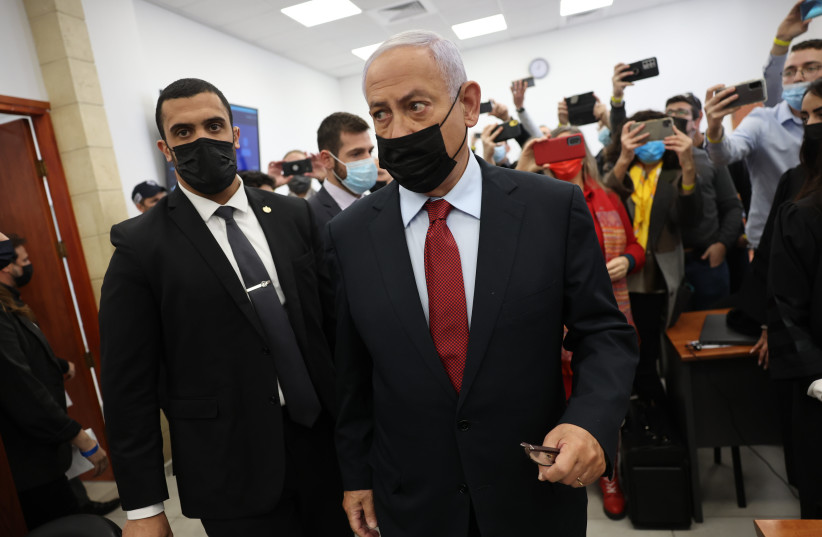Case 4000 in the public corruption trial of former prime minister Benjamin Netanyahu will pass through one of its last key points with the cross-examination of Shlomo Filber set to start on Tuesday.
Along with former top Netanyahu aide turned state’s witness Nir Hefetz who previously testified, Filber, who was a Netanyahu campaign chief and later his Communications Ministry director-general, has been one of the prosecution’s two main witnesses for Case 4000, the Bezeq-Walla Affair.
If Hefetz provided the prosecution’s narrative for allegations against Netanyahu on the Walla side of the case, over the course of about three weeks starting on March 23, Filber closed the circle by testifying in favor of the prosecution narrative against the former prime minister on the Bezeq side.
Filber’s testimony was damaging enough in checking key boxes of the prosecution narrative that avoiding his testimony was one of many reasons why Netanyahu was hoping to cut a deal with former attorney-general Avichai Mandelblit before the end of January.
Whether the defense can shake up some of the points Filber made for the prosecution could determine whether such a deal goes through this coming summer – and if so, whether Netanyahu has a chance at a deal that would let him continue in politics.

During his testimony, Filber testified that the former prime minister gave him the order to do what Bezeq and Walla owner Shaul Elovitch wanted on several issues.
Filber specifically flagged for the Jerusalem District Court that the Bezeq-Yes merger, issues of pricing reforms and other telecommunications-related reforms to increase competition were matters that Netanyahu mentioned to him in the key meeting which brought the case forward.
At the same time, Filber made several statements diluting some of his accusations against Netanyahu.
Netanyahu’s defense team will be sure to focus on these issues during cross-examination in their efforts to obtain an acquittal.
When Filber said that his key Netanyahu meeting occurred while standing, this departed from his testimony to police that they were sitting on the office couch as Netanyahu smoked a cigar.
MORE IMPORTANTLY, Filber added reasons for his motivations for advancing Bezeq policies.
Although he carefully avoided contradicting his earlier testimony to police that one motivation for helping Bezeq was to please Netanyahu – which would violate his plea deal and could land him in jail – he also added two new motivations.
Filber essentially said that he also helped Bezeq for his own personal success and because aspects of helping Bezeq made sense on a policy level.
While the prosecution tried to gloss over these mixed messages and almost declared Filber a hostile witness, Netanyahu’s team will likely spend weeks or even months getting him to catalogue every time he made an independent decision.
In addition, Filber accused the police of confronting him like attack dogs who wanted to have him incriminate Netanyahu at any cost.
The defense has already made alleged police abuse of power one of the recurring themes of the trial.
They are likely to explore with Filber every statement he made to police that he seems to have later recanted, getting him to show that overall Netanyahu was balanced regarding the rule of law.
Next, Filber said that when Netanyahu gave him the orders about pleasing Bezeq, the emphasis was on the policies, as opposed to pleasing Elovitch.
Again, on cross-examination, the defense will do all it can to turn the courts against the police, including delving much deeper into the alleged Pegasus spying charges, and therefore against the state’s evidence.
The specific issue that finally led the prosecution to lose patience with Filber was when he tried to act as if he did little wrong with his back-channeling with Bezeq officials behind the back of his own Communications Ministry officials in order to help them with the Bezeq-Yes merger and other issues.
The defense will try to pounce on these qualifications during cross-examination.
However, the prosecution got Filber to say that Netanyahu yelled at him for not firing an official who Bezeq wanted gone; that Bezeq approvals which should take three years, he expedited in three weeks; and that when Netanyahu asked him if any laws were broken regarding Bezeq, it was obvious that the former prime minister was “playing dumb.”
It is unclear how the defense will treat these issues.
Also, Netanyahu will now have to look into the eyes of new Attorney-General nominee Gali Baharav-Miara – who lacks the back-history and appreciation of him that he had from Mandelblit – as being a new source of power over his fate if he wants to try to cut a deal in the spring or summer.
